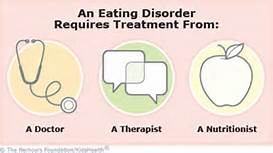The eating disorders anorexia nervosa, bulimia nervosa, and binge-eating disorder, and their variants, all feature serious disturbances in eating behavior and weight regulation. They are associated with a wide range of adverse psychological, physical, and social consequences. A person with an eating disorder may start out just eating smaller or larger amounts of food, but at some point, their urge to eat less or more spirals out of control. Severe distress or concern about body weight or shape, or extreme efforts to manage weight or food intake, also may characterize an eating disorder.
Eating disorder treatment also involves addressing other health problems caused by an eating disorder, which can be serious or even life-threatening if they go untreated for long enough. If an eating disorder doesn’t improve with standard treatment or causes health problems, you may need hospitalization or another type of inpatient program.
Having an organized approach to eating disorder treatment can help you manage symptoms, regain a healthy weight, and maintain your physical and mental health.
Eating disorders are real, treatable medical illnesses. They frequently coexist with other illnesses such as depression, substance abuse, or anxiety disorders. Other symptoms can become life-threatening if a person does not receive treatment, which is reflected by anorexia being associated with the highest mortality rate of any psychiatric disorder.
Eating disorders affect both genders, although rates among women and girls are 2½ times greater than among men and boys. Eating disorders frequently appear during the teen years or young adulthood but also may develop during childhood or later in life.
How are eating disorders treated?
Typical treatment goals include restoring adequate nutrition, bringing weight to a healthy level, reducing excessive exercise, and stopping binging and purging behaviors. Specific forms of psychotherapy, or talk therapy—including a family-based therapy called the Maudsley approach and cognitive behavioral approaches—have been shown to be useful for treating specific eating disorders. Evidence also suggests that antidepressant medications approved by the U.S. Food and Drug Administration may help for bulimia nervosa and also may be effective for treating co-occurring anxiety or depression for other eating disorders.
Treatment plans often are tailored to individual needs and may include one or more of the following:
- Individual, group, or family psychotherapy
- Medical care and monitoring
- Nutritional counseling
- Medications (for example, antidepressants).
You may start by seeing your family doctor or mental health counselor, such as a psychologist. You may also need to see other health professionals who specialize in eating disorder treatment. Other members of your treatment team may include:
- A registered dietitian to provide nutritional counseling.
- A psychiatrist for medication prescription and management, when medications are necessary. Some psychiatrists also provide psychological counseling.
- Medical or dental specialists to treat health or dental problems that result from your eating disorder.
- Your partner, parents or other family members. For young people still living at home, parents should be actively involved in treatment and may supervise meals.
It’s best if everyone involved in your treatment communicates about your progress so that adjustments can be made to your treatment as needed.
Managing an eating disorder can be a long-term challenge. You may need to continue to see your doctor, psychologist or other members of your treatment team on a regular basis, even if your eating disorder and related health problems are under control.
Some patients also may need to be hospitalized to treat problems caused by malnutrition or to ensure they eat enough if they are very underweight. Complete recovery is possible.

